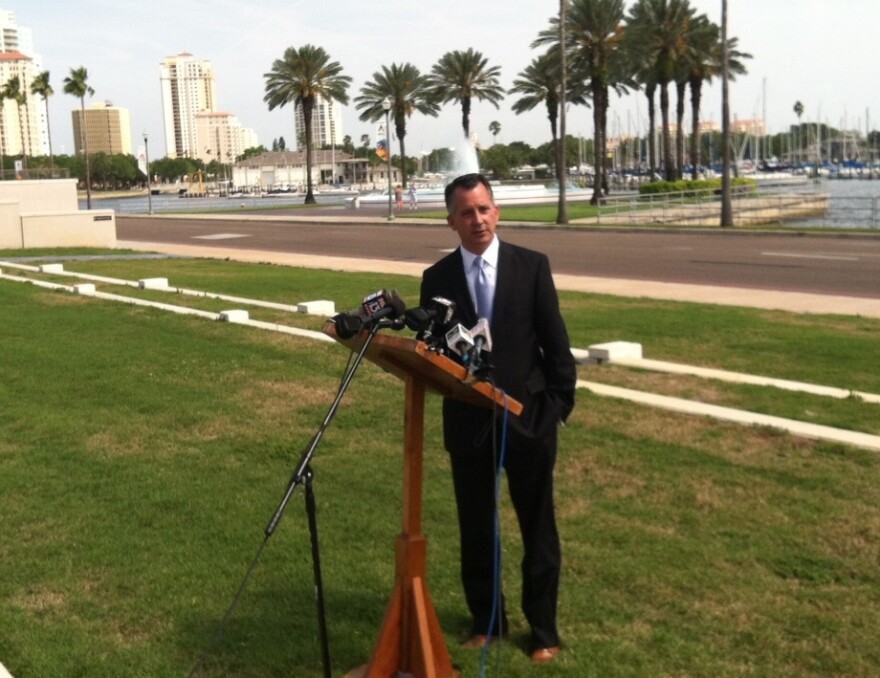Sunday marks the 4th anniversary of the BP oil spill in the Gulf of Mexico. Even though most of the visible oil is gone, the effects of chemical dispersants that sank much of the oil to the Gulf's bottom linger on. Today, a group of scientists and environmental activists marked the occasion with a call for more action to protect the Gulf.
The wind- and wave-whipped St. Petersburg waterfront formed the backdrop for what amounted to a plea for more research into how marine life in the Gulf has been affected by the spill - and how to prevent it from happening again.
Congressman David Jolly was joined by St. Petersburg Mayor Rick Kriseman, Robert Weisberg of USF St. Petersburg's College of Marine Science, Cathy Harrelson of the Gulf Restoration Network, Lucinda Johnston of the environmental group Chart411 and the Sierra Club's Phil Compton.
David White with the National Wildlife Federation says a report published this week by his group traces oil from to the spill in every level of the food chain, from tiny plankton to whales. He says oil has been found in the embryos of white pelicans in Minnesota, where they nest after spending their winters n the Gulf.
"We know that this is not over by any means," says White. "The impacts of the Exxon Valdez did not show up until years after the oil spill was over, and it's allegedly cleaned up, and we need to remain focused on the science and what it tells us about restoring the Gulf."

The state has announced it's ready to spend $100 million on projects paid for by an agreement with BP, but White says there's no comprehensive restoration plan put in place to make sure the money goes where it's most needed.
The St. Petersburg gathering was held at the same time as similar events in New Orleans, Louisiana and Biloxi, Mississippi. These meetings were held to ask that BP and other oil and gas companies be held accountable for their actions, called for transparency and public participation as restoration efforts begin to move forward in the Gulf.
Tampa Bay Congresswoman Kathy Castor was not able to attend, but issued this statement:
"Today we are reminded that Florida’s jobs in the tourism, fishing, recreation and wildlife industries rely upon a healthy and resilient Gulf of Mexico, and that the threat of a future spill is a threat to our economy. In Florida and the Gulf coast, a healthy environment means a healthy economy.
“This past year I supported legislation to significantly reduce the chance of another blowout by imposing safety standards for risky offshore oil drilling based on what we learned from this terrible accident and increase liability for polluters.”
According to the Gulf Restoration Network:
Despite BP declaring an end to “active recovery” this week, oil continues to wash up on the Gulf’s shores. On an April 9th monitoring trip to Barataria Bay and Grand Isle, Louisiana, Gulf Restoration Network documented fresh tar balls on the beaches and a dead dolphin in the surf. One recent study linked BP’s oil to problems with heart health in bluefin tuna and amberjack. Similar results have been found after other oil spills, including the Exxon-Valdez disaster. “The BP disaster was the largest manmade environmental catastrophe in U.S. history, but sadly it wasn’t the first or the last time we’ve seen the oil and gas industry pollute our environment and endanger our communities,” said Steve Murchie, Campaign Director with the Gulf Restoration Network in New Orleans. “Twenty five years after the Exxon-Valdez disaster and four years after BP, not enough action has been taken to protect coastal communities from the impacts of oil and gas development, extraction, and transportation”. This sentiment was echoed in St. Petersburg by Lucinda Johnston of Chart411 and Phil Compton of the Sierra Club. Compton described the toll the Keystone XL Pipeline and other oil and gas projects will take on our climate and our water and calling for clean energy and clean transportation solutions. Johnston had a simple message – “we can all do something to change the future, it’s up to us.”




